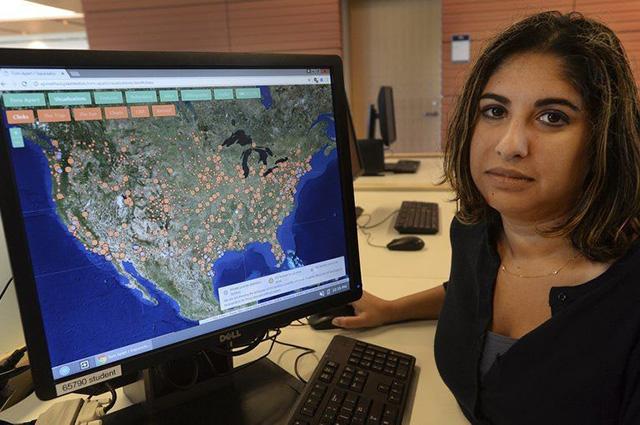Roopika Risam Discusses Rapid Response Research in Moments of Crisis

Written for Tisch College by Anton Shenk, A22
On February 4th, Tisch College hosted a conversation with Roopika Risam, Assistant Professor of English at Salem State University and a core member of Torn Apart/Separados, a data visualization group composed of librarians, faculty, and graduate students who responded to the Trump administration’s family separation policy by creating maps and other visual media to tell the story of that policy’s repercussions.
Professor Risam’s talk was part of Tisch College’s Program for Public Humanities, an initiative that explores, promotes, and celebrates the connections between the humanities and civic life, and the potential impact of artistic media and other forms of expression on issues of public concern. Led by Prof. Diane O’Donoghue, Tisch College’s Senior Fellow for the Humanities, the Program hosts a series of spring semester talks each year that bring artists and academics to campus to discuss their work in this field.
In her recent presentation at Tisch College, Risam described the Torn Apart/Separados project as rapid response research, a strategy that she and the rest of her team defines as “quickly deployed scholarly interventions in pressing political, social, and cultural crises.” Strikingly, the entire project was pulled together in just six days. Working remotely from various institutions, both in the United States and internationally, a small team of researchers identified sources of information on immigrant detention and pulled together a large database on the actions and resources of several U.S. federal agencies, from Customs and Border Protection (CBP), to Immigration and Customs Enforcement (ICE), to the Department of Health and Human Services’ Office of Refugee Resettlement (ORR). The group also followed the financial trails left by a network of public, private, and non-profit organizations involved with the complex infrastructure of immigrant detention in the United States.
The resulting products, which Professor Risam showed at the event, include data visualizations on ICE contracts and facilities, as well as a comprehensive database of juvenile detention facilities, several of which were at the center of public debate on this issue.
The Torn Apart/Separados team’s work has already resulted in two curated volumes and dozens of data visualizations, with additional volumes potentially on the way. The group currently offers its data to other researchers in hopes that it can be used to continue telling the story of immigration policy in the United States.
During her presentation, Risam also shared some of the challenging ethical dilemmas that her team grappled with during the course of their work. In an essay on the project’s website, the group wrote that “revealing the addresses of these facilities, particularly children’s shelters, was a matter of great concern,” adding that “while [they] were using publicly available data, aggregating it in a single place seemed a potentially dangerous choice, offering a road map to an already vulnerable population or preempting careful organization by activists.”
In addition, at times the research proved emotionally challenging. In one instance, on the Google search result about a youth facility, the group found a post from a parent in Spanish that read, “I need information about my daughter.” As if to reflect and underscore the widely reported confusion and lack of information resulting from family separation, below the question Google simply displayed the phrase “No Answers.”
“It was fascinating to hear Roopika Risam describe some of the challenges - intellectual, ethical, and personal - that she and her team faced in undertaking this work,” said Prof. O’Donoghue, who introduced the speaker and moderated the conversation. “This kind of activism attests to the potential for public humanities to exemplify the uses scholarship and skills in the service of what is humane.”
The Tisch College Program for Public Humanities will host two more events this semester—“Silencing Sound & Sounding Silence: Shostakovich's ‘Babi Yar’ Symphony and the Music of Conscience” and “Quorum Boston: Queer Composers & Resistance to Erasure”. You can find more details about those talks here.